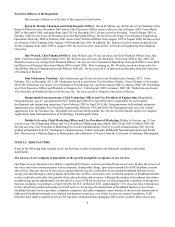8x8 2012 Annual Report Download - page 21
Download and view the complete annual report
Please find page 21 of the 2012 8x8 annual report below. You can navigate through the pages in the report by either clicking on the pages listed below, or by using the keyword search tool below to find specific information within the annual report.
19
consistent with the original order. At this time, we cannot predict what, if any, impact the FCC’ s clarification order will have
on our business.
The FCC's Order reforming payments that carrier exchange for various type of traffic also imposes call signaling
requirements on VoIP providers like us. To the extent that we cannot comply with these rules, we may be subject to
fines, cease and desist orders, or other penalties.
The FCC Order reforming the system of compensation for various types of traffic also included rules to address calls for which
identifying information is missing or masked in ways that impede billing for such traffic. The FCC's new rules require, among
other things, interconnected VoIP providers, like us, that originate interstate or intrastate traffic destined for the PSTN, to
transmit the telephone number associated with the calling party to the next provider in the call path. Intermediate providers
must pass calling party number or charge number signaling information they receive from other providers unaltered, to
subsequent providers in the call path. While we believe we are in compliance with this rule, to the extent that we pass traffic
that does not have appropriate calling party number or charge number information, we could be subject to fines, cease and
desist orders, or other penalties.
The FCC's Order reforming payments between carriers for various types of traffic also includes a Further Notice of
Proposed Rulemaking. Depending on the rules adopted by the FCC in this proceeding, the payments we make to
underlying carriers to access the Public Switched Telephone Network may increase, which may result in us increasing
the retail price of our service, potentially making our offering less competitive with traditional providers of
telecommunications services, or may reduce our profitability.
The FCC's Order reforming payments between carriers for various types of traffic includes a Further Notice of Proposed
Rulemaking which may result in the FCC adopting additional rules applicable to the exchange of traffic between regulated
providers of telecommunications services. While it is uncertain what rules, if any, the FCC will adopt and when the FCC may
do so, it is possible that as a result of this proceeding the charges our underlying service providers assess us will increase when
we send traffic to the Public Switched Telephone Network. Should this occur, we may have to raise the retail rate of our
offering, potentially making our services less competitive with traditional providers of telecommunications services, or our
profit margins may decrease. The FCC proceeding is ongoing and we cannot predict whether the FCC will act or what rules it
may adopt nor can we predict what impact it may have on our business at this time.
A recent petition filed by tw telecom inc. with the FCC seeks an Order that its provision of facilities-based
interconnected VoIP services should be classified as "telecommunications services," "telephone exchange services,"
and/or "exchange access" under relevant federal law. We cannot predict the outcome of this proceeding nor its impact
on our business at this time.
In July 2011, the FCC released a Public Notice concerning a Petition for Declaratory Ruling filed by tw telecom inc. The
Petitioner requests the FCC to clarify that incumbent providers of local telephone service, like AT&T and Verizon, allow for
direct IP-to-IP interconnection with incumbent local exchange carriers for certain IP-based services. Specifically, tw telecom
seeks direct IP-to-IP interconnection from incumbent local telephone companies for the transmission and routing of tw
telecom's facilities-based VoIP services and for voice services that originate and terminate in Time Division Multiplexing
format but are converted to IP format for transport (referred to by the industry as "IP-in-the-middle" voice services).
Additionally, tw telecom is asking for the FCC to clarify that its facilities-based VoIP services are "telecommunications
services" as well as "telephone exchange services" and/or "exchange access," as those terms are defined under the
Communications Act of 1934, as amended by the Telecommunications Act of 1996. We cannot predict the outcome of this
proceeding nor its potential impact on our business at this time. Depending on how the FCC rules on the tw telecom petition,
we could be subject to greater regulation at the state level which would increase our costs of doing business. It is also possible
that an adverse ruling by the FCC in this proceeding could change the intercarrier compensation rate that our carriers pay to
handle our traffic which could also increase our costs. Increased costs to us may require us to raise our prices, making our
services less competitive, reduce our profit margins, or both.
























